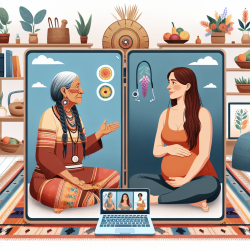Introduction
In the realm of maternal and child health, the integration of cultural teachings and modern technology has emerged as a beacon of hope. The research article, "Ohpikihâwasowin (grounding and guiding on the path to be a healthy parent): virtual adaptation of an Elders mentoring program to support maternal and child wellbeing during the COVID-19 pandemic," provides compelling evidence of how virtual adaptations can enhance maternal health outcomes among Indigenous communities. This blog post explores the implications of this research for practitioners and highlights the potential for further exploration in this field.
Research Overview
The study focused on the Elders Mentoring Program (EMP), a community-based initiative in the Cree communities of Maskwacîs, Alberta, Canada. Originally designed to provide traditional Cree teachings and support to pregnant women and their partners, the program was adapted to a virtual format during the COVID-19 pandemic. This shift allowed Elders to continue offering mentorship via Zoom and telephone, ensuring the continuity of cultural teachings despite physical distancing measures.
Key Findings
The research identified four main themes from participants' experiences:
- Ohpikihâwasowin: Grounding and guiding on the path to be a healthy parent.
- Indigenous Ways of Healing: Utilizing cultural teachings and language for personal healing.
- On the Path of Cultural Learning: Opportunities to learn about Cree culture and traditional parenting.
- Identity for Self and Baby: Revitalizing Indigenous identity and instilling pride in future generations.
Implications for Practitioners
For practitioners, the findings underscore the importance of incorporating cultural elements into maternal health programs. The virtual EMP demonstrated that technology could effectively bridge the gap between traditional teachings and modern healthcare, providing a culturally safe space for Indigenous women. Practitioners are encouraged to consider the following strategies:
- Integrate cultural teachings into existing maternal health programs to enhance engagement and outcomes.
- Utilize virtual platforms to increase accessibility, especially for those living away from their communities.
- Foster partnerships with Indigenous Elders to provide mentorship and support to expectant mothers.
Encouraging Further Research
While the virtual EMP has shown promising results, further research is needed to explore its long-term impacts and potential applications in other Indigenous communities. Practitioners and researchers are encouraged to investigate:
- The scalability of virtual mentoring programs across different cultural contexts.
- The role of technology in facilitating cultural connections and improving maternal health outcomes.
- The impact of such programs on intergenerational healing and resilience.
Conclusion
The virtual adaptation of the Elders Mentoring Program has highlighted the potential of combining cultural teachings with technology to improve maternal health outcomes. As practitioners, embracing these findings can lead to more culturally responsive and effective healthcare services. To delve deeper into the research, you can read the original paper Ohpikihâwasowin (grounding and guiding on the path to be a healthy parent): virtual adaptation of an Elders mentoring program to support maternal and child wellbeing during the COVID-19 pandemic.










